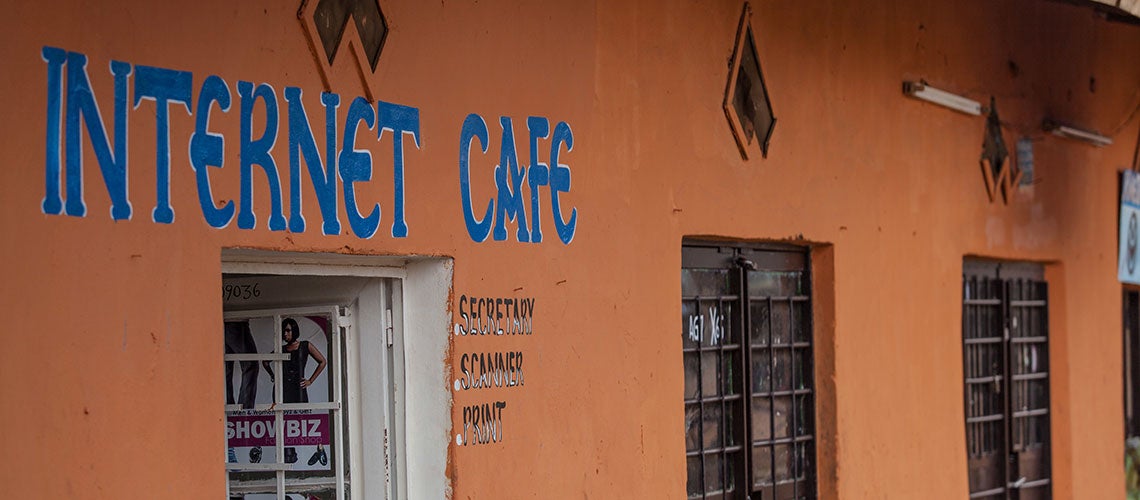 Internet cafe in the neighborhood of Nyamirambo in Kigali, Rwanda. Home to a mixed population, including much of the city’s working class and Muslim population, as well as bars, boutiques and hair salons, Nyamirambo is known to be one of the most vibrant neighborhoods of Kigali.
Internet cafe in the neighborhood of Nyamirambo in Kigali, Rwanda. Home to a mixed population, including much of the city’s working class and Muslim population, as well as bars, boutiques and hair salons, Nyamirambo is known to be one of the most vibrant neighborhoods of Kigali.
In 2018, the International Telecommunication Union reported that for the first time, more than 50% of the world’s population was using the Internet. Unfortunately, more than two-thirds of Africa (75.6%) lacked access to the internet.
There are several reasons for digital exclusion in African countries. In addition to lack of adequate broadband infrastructure, and digital illiteracy, controversial laws have contributed. In Uganda, a law that imposes social media tax of 200 Ugandan shillings ($0.05) per day for citizens to use social media like Twitter, Facebook and WhatsApp has led to a drop in internet usage rates from 47.4% to 35% in six months.
Furthermore, with an existing 18% difference in internet access between men and women in Uganda, the taxes have further widened the digital gender divide. Similar legislations have been introduced in Benin Republic, Zambia, and Tanzania.
Broadband is key to bridging the digital divide between urban and rural communities in education, health, transport and financial operations. World Bank studies have shown that a 10% increase in broadband penetration in developing countries accelerates economic growth by 1.38%.
As the world’s youngest continent, Africa’s young people will be the biggest beneficiaries of robust access to digital technologies. Hence, I spoke to some young leaders about how to end digital exclusion. Here are just a few of their ideas:
Governments must act
The first political action is to have laws and policies about the digital space. People must know what exactly they are able to do or not. Also, these laws should encourage investment in digital technologies. Secondly, governments must integrate digital courses in schools. – Kelvin Adantchede Nonvignon, Electrical Engineer and Tech Innovator in Benin Republic
We need transformative solutions
In Africa’s quest to catch up, it needs transformative solutions which are going to completely change the status quo. Project financiers must put in place very rigorous vetting bodies in the process of acquiring implementers for ICT projects. A ‘go hard or go home’ approach should be adopted to ensure that only solutions which are going to ensure that the continent takes a large stride are going to be implemented. – Ephraim Modise, Computer Science Student at the University of Botswana, Botswana
Africa should develop infrastructure and improve digital literacy
We need to invest in infrastructure to connect rural areas which are often excluded. Moreover, we need to extend the smart cities concept to smart villages. Also, there is need to boost digital literacy among the population and TVET (Technical and Vocational Education and Training) would help to compensate the digital gap between the Generation X and the millennials – Amour-Freddy Bilombo, Engineer in Congo Brazzaville
Let us create digital clubs
In Malawi the most digitally excluded demographic are the rural adults, who in many cases are illiterate and do not understand the value of digital technology. However, we have rural adult literacy programs that can be turned into digital clubs; give them a computer, some smartphones, and internet connection. We should have at least one club per village and we would be including more people in the digital space. – Wrixon Mpanang’ombe, Founder of Our Fresh Futurz in Malawi
Prioritize digital literacy
People do not know what to do with technology even after accessing it. We must focus on digital literacy so that people don’t just get access, but also know what to do with it. – Femi Abraham, Programme Development Officer at LEAP Africa in Nigeria
Africa must produce its digital hardware
Africa must begin to produce its own digital hardware and invest in digital education. – Tholoma Sumah, Executive Director, Foundation for Development in Sierra Leone
There is need for user-friendly technology
We can end digital exclusion by providing technology that is user friendly and accessible to all Africans. For example, the use of USSD codes has been successful because even uneducated people from rural areas can use mobile money to make transactions. – Alice Magaka, Student and Founder of The Pink Box Project in Tanzania
Focus should shift to rural areas
To end digital exclusion, stakeholders in the digital space need to shift focus to rural areas. Firstly, the government working together with network provider companies should ensure that rural areas have affordable access to internet. Also, entrepreneurs in the digital space should extend their ICT products and services for people in rural areas. – Musopa Kalenga, Msc Development Studies Student in Zambia
We don’t have any more time to waste. Africa can only fulfil its potential in the digital age by ensuring easy, inclusive, and responsible access to digital technologies. We must bring rural communities and other excluded groups to the digital space now to make the benefits of digitalization accessible to all.


Join the Conversation